
Bertrand Arthur William Russell, 3rd Earl Russell, was a British mathematician, philosopher, logician, and public intellectual. He had a considerable influence on mathematics, logic, set theory, linguistics, artificial intelligence, cognitive science, computer science and various areas of analytic philosophy, especially philosophy of mathematics, philosophy of language, epistemology, and metaphysics.
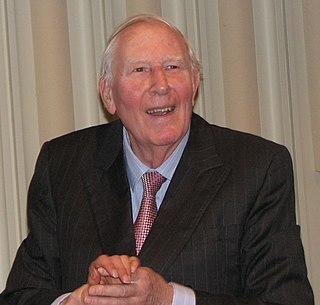
Sir Roger Gilbert Bannister was an English neurologist and middle-distance athlete who ran the first sub-4-minute mile.
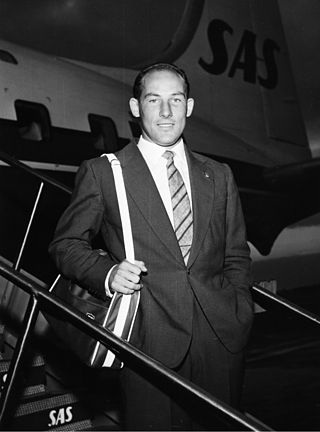
Sir Stirling Craufurd Moss was a British Formula One driver. An inductee into the International Motorsports Hall of Fame, he won 212 of the 529 races he entered across several different motorsports competitions and he has been described as "the greatest driver never to win the Formula One World Championship". In a seven-year span between 1955 and 1961 Moss finished in second place four times and in third place three times.

John Michael Landy OLY was an Australian middle-distance runner and state governor. He was the second man to break the four-minute mile barrier in the mile run and held the world records for the 1500-metre run and the mile race. He was also the 26th Governor of Victoria from 2001 to 2006.
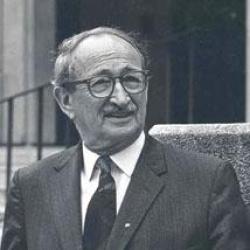
Sidney Hook was an American philosopher of pragmatism known for his contributions to the philosophy of history, the philosophy of education, political theory, and ethics. After embracing communism in his youth, Hook was later known for his criticisms of totalitarianism, both fascism and Marxism–Leninism. A social democrat, Hook sometimes cooperated with conservatives, particularly in opposing Marxism–Leninism. After World War II, he argued that members of such groups as the Communist Party USA and Leninists like democratic centralists could ethically be barred from holding the offices of public trust because they called for the violent overthrow of democratic governments.
Sir Michael Francis Bonallack, OBE is an English amateur golfer who was one of the leading administrators in world golf in the late 20th century.
Marlene Stewart Streit, is a Canadian amateur golfer, and a member of the World Golf Hall of Fame.

John Dickerson "Jackie" Parker was an American gridiron football player and coach. He was an All-American in college football and an outstanding professional football player in the Canadian Football League at the running back, quarterback, defensive back, and kicker positions. He is primarily known for his play with the Edmonton Eskimos. Later in his career, he played for the Toronto Argonauts and the BC Lions, and coached the Eskimos and Lions after his playing career ended.
Muhammed Taher Pasha was an Egyptian doctor of political science, originally of Turkish origin, and the founder of the Mediterranean Games. He was the chairman of the Egyptian Olympic Committee and also a member of the Executive Commission of the International Olympic Committee from 1952 to 1957.
David Russell may refer to:
This article is about the particular significance of the year 1953 to Wales and its people.
Ken Pears is a former Canadian soccer goalkeeper. He was a four-time national champion with Westminster Royals FC (1953), Vancouver Hale-Co FC (1956), Vancouver Columbus FC (1964), and Vancouver Firefighters FC (1965). He was Canada's starting goalkeeper during FIFA World Cup Qualifiers in 1957. He is an honoured member of the Canada Soccer Hall of Fame as part of the inaugural class in 2000.
The Aristotelian Society for the Systematic Study of Philosophy, more generally known as the Aristotelian Society, is a philosophical society in London.
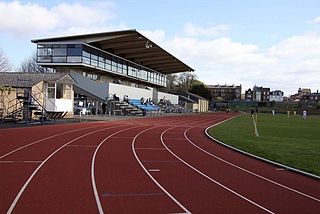
The Roger Bannister running track, also known as the Oxford University track, is a 400-metres athletics running track and stadium in Oxford, England. It was where Sir Roger Bannister broke the four-minute mile on 6 May 1954, when it was known as the Iffley Road track. The track is owned and operated by the University of Oxford.
Harry Bradshaw was a leading Irish professional golfer of the 1940s and 1950s.

Russell Gordon Napier was an Australian actor.

William Grigs Atkinson, known professionally as Paul Cavanagh, was an English film and stage actor. He appeared in more than 100 films between 1928 and 1959.
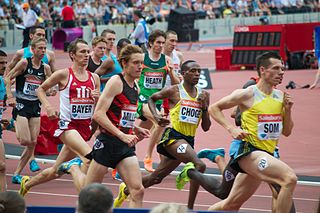
The Emsley Carr Mile is an annual invitational athletics running event held in the United Kingdom over one mile for men. The race was won in 2022 by the British athlete Matthew Stonier.

The 1950 Nobel Prize in Literature was awarded the British philosopher Bertrand Russell (1872–1970) "in recognition of his varied and significant writings in which he champions humanitarian ideals and freedom of thought." He is the fourth philosopher to become a recipient of the prize after the French analytic-continental philosopher Henri Bergson in 1927, and was followed by the French-Algerian existentialist Albert Camus in 1957. He is also the fifth British author to be awarded.










